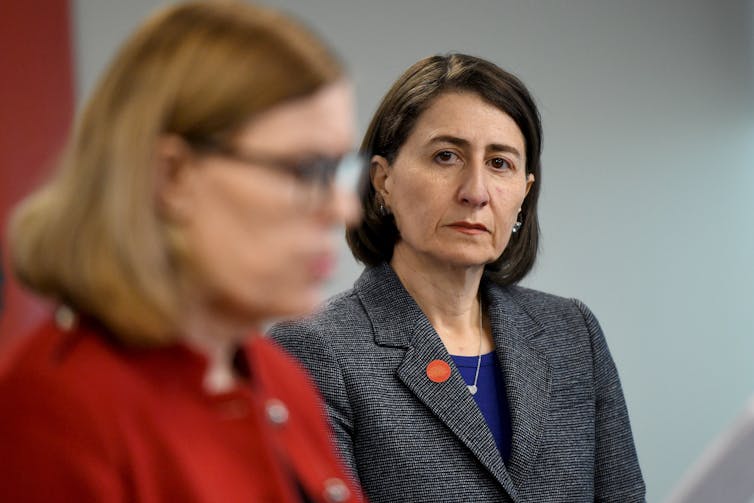Victoria hits bleak record of 484 new cases, NSW at a critical point — if you feel sick, get tested then stay home
- Written by Hassan Vally, Associate Professor, La Trobe University
Too many people are going out while experiencing COVID-19 symptoms or while awaiting test results, Victorian Premier Daniel Andrews said on Wednesday, after the state hit a bleak new record of 484 new cases. The state’s previous worst daily case number was 428 last Friday.
It’s always a shock to see a new record number, and certainly these numbers are bigger than we would have hoped. While it’s a psychological blow, it’s not cause for panic. Thankfully, we are not seeing a doubling or tripling of case numbers, which really would ring alarm bells.
Read more: A $200 fine for not wearing a mask is fair, as long as free masks go to those in need
Too many people going out while sick
Andrews chastised people for taking too long to get tested after first experiencing symptoms, which include fever, cough and sore throat. He said:
From 3,810 cases, which are the cases between July 7 and July 21, I’m very unhappy and very sad to have to report that nearly nine in ten - or 3,400 cases - did not isolate between when they first felt sick and when they went to get a test […]
That means people have felt unwell and just gone about their business. They have gone out shopping, they have gone to work, they have been at the height of their infectivity and they have just continued on as usual […] The one and only thing that you can and must do when you feel sick is to go and get tested. Nothing else is acceptable.“
He also said 53% those 3,810 cases "did not isolate, that is, did not stay at home and have no contact with anybody else — between when they had their test taken and when they got the results of that test.”
Unless people stay home when unwell and isolate while awaiting test results, the case numbers will continue to climb, Andrews said.
The premier noted self-isolation would leave some people with no income, and urged people in that situation to call 1800 675 398 to apply for an emergency A$1500 payment.
It’s good to see the premier acknowledge income as one of the major drivers for these behaviours; people may not always have the financial flexibility to do the right thing.
Hopefully, making more people aware of the emergency payment option will help counteract this.
The government may have to work harder to ensure people know to self-isolate, and that the emergency payment is available, and I suspect this will be promoted more widely.
NSW at a critical point
In New South Wales, Premier Gladys Berejiklian said there were 16 new cases in the 24 hours to 8pm last night, all traced to known clusters. She called on people to avoid crowded places, wash hands, stay home if unwell and get tested if they have even mild symptoms.
Berejiklian said from Friday, NSW businesses breaking rules on COVID-Safe registration, and breaching caps on group bookings, would “be fined — worse than that, if you breach again you will be shut down”.
NSW is on especially high alert. Despite this, it’s somewhat reassuring to know the state’s new cases can be traced to known outbreaks. However NSW residents are not out of the woods yet.
Speculation is rife that further lockdowns might be on the way in NSW. While nothing should be off the table, it doesn’t appear NSW is anywhere near this point yet. The state has more than enough capacity to bring things under control from where the numbers sit now.
 NSW is especially on high alert.
BIANCA DE MARCHI/AAP Image
NSW is especially on high alert.
BIANCA DE MARCHI/AAP Image
Read more: Vaccine progress report: the projects bidding to win the race for a COVID-19 vaccine
Today’s news serves as a grim reminder we must all follow the golden rules of pandemic management: get tested if you experience even mild symptoms, stay home if unwell or awaiting test results, wash your hands often, physically distance from others, limit social gatherings, and wear a mask if you can’t physically distance (face-coverings will be mandatory for residents of metropolitan Melbourne and Mitchell Shire as of midnight Wednesday).
As to where things move from here, much of that is in our hands as individuals. Each of us, by doing everything we can to prevent the spread of the virus, can make a massive contribution to saving lives and defeating COVID-19.
The silver lining is that we know what’s needed. What we’re being asked to do is not easy, but we do know how to bring this coronavirus pandemic under control. We’ve done it before and we can do it again.
Authors: Hassan Vally, Associate Professor, La Trobe University




